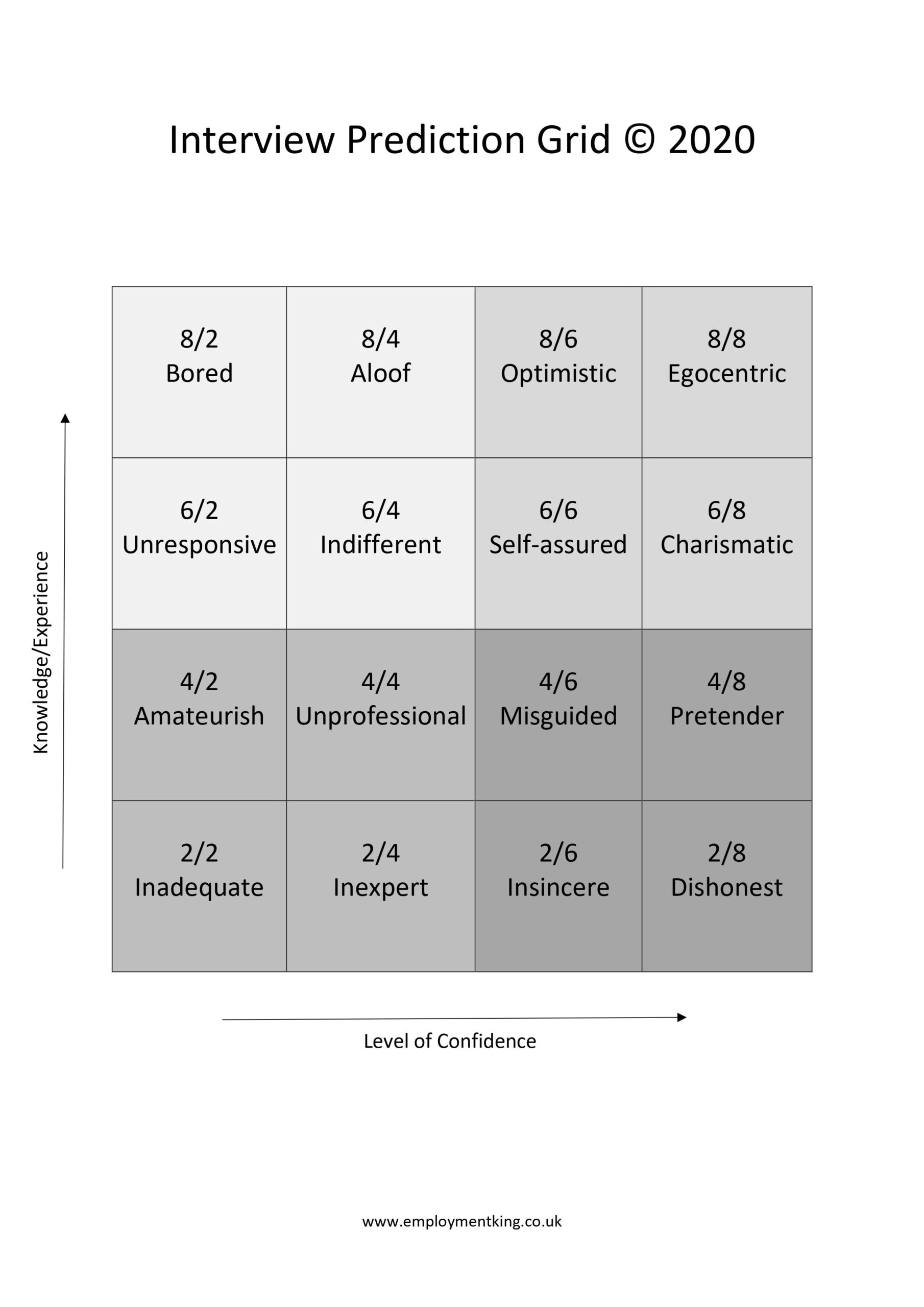Congratulations on completing the Interview Prediction Grid Test (IPG) ©2020.
Below is a breakdown of your Interview Identity
4/6 – Misguided

The interview process is designed to uncover the interviewee’s strengths and weaknesses, through a series of questions.
With a sufficient level of experience/knowledge, the 4/6 – Misguided applicant can often believe, due to the medium confidence level, that they are entitled to a higher-level position. This belief is unwarranted, as many other interview identities possess the same or a higher level of confidence, along with a higher level of expertise.
Those 4/6 – Misguided interviewees feel confident as they may have had previous successes winning low-skilled positions against weaker candidates. This is because a medium level of confidence results in stronger self-promotion than that of a sufficient confident applicant. But employers recruiting medium-skilled workers demand a particular set of essential criteria.
It is often the lack of ability to identify the job criteria, and therefore present the relevant skills embedded within the job interview answer(s), that is the downfall for a 4/6 – Misguided applicant.
Strengths
For low-skilled positions, 4/6 – Misguided candidates are likely to gain offers of employment when applying for roles that match their current level of knowledge/experience. The ability to speak with authority on subjects they are very familiar with, increases the employer’s respect resulting in high scoring answers.
When discussing past experiences, communication is strong with answers being well-structured and to the point. The delivery style is also good, as confidence improves diction, pace, vocal variety, and emotive language.
The medium level of confidence results in the use of relevant stories and examples, not just stating facts as a low confident interviewee would. This storytelling creates intrigue and interest, often scoring high as research tells us that a high number of words per answer increases interview points.
Interview presentations also scored high as applicants have ample time to prepare in advance, helping them to be seen as more knowledgeable than they actually are. During the presentation itself, they come across as highly competent as they feel at ease being in the spotlight.
Development
Having some industry experience and/or sector-related qualifications is enough to answer a few technical questions, but not enough to be viewed as an expert.
The medium level of confidence can create an unrealistic self-identity, where 4/6 – Misguided interviewees believe they will be offered the job role. The scoring system of a structured interview can become their undoing with answers scoring low due to missing criteria.
For promotional roles – attempting to gain work in medium-skilled positions, many of the competition will have higher level qualifications and therefore a greater understanding of sector theories and models. A longer period of direct experience helps a competitor feel competent when challenged on industry related problems.
It is when challenged or asked to discuss a concept that the 4/6 – Misguided interviewee is unfamiliar with that causes a decrease in confidence, resulting in a weak answer.
Requesting to be part of a team working on a new project in their current place of work, or to be mentored by a senior staff member can help to increase knowledge/experience improving the perceived ‘interview identity’. Learning from experts can be an educational shortcut.
Gaining a degree level qualification increases knowledge of sector-related models and theories, helping applicants to answer questions where they lack actual work experience.

Advice for the job interview
- Utilise self-debate to give a detailed answer by discussing the advantages and disadvantages the underlying skill or knowledge the interview question references
- Explain sector-related theories and models relevant to the job role in question. Break these down into specifics as this will help you come across as knowledgeable
- Increase self-promotion; focus the main section of an interview answer on the added value you can bring to the team
Research: IPG




